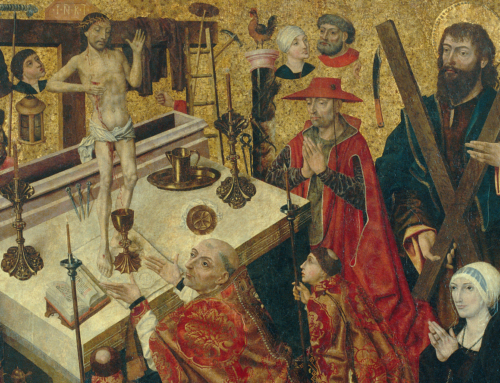Today is Spy Wednesday, the day when Judas contracts with the chief priests to hand over his Master for thirty pieces of silver. It’s also the day when the Church holds the service of Tenebrae—Latin for “darkness”—in which she contemplates the various darknesses that will envelop her Lord in the coming three days.
One of the greatest musical settings of the service—Victoria’s Tenebrae Responsories—begins with a prolonged meditation on “the mystery of the betrayal.” The liturgy portrays the treachery from three different angles, each time slightly recasting words that Jesus spoke at the Last Supper in the presence of his betrayer:
It had been well for that man, had he never been born.
The focus on Judas is not intended to make us feel better about ourselves by contrast with that “most miserable merchant.” We are meant rather to consider the folly of the exchange, the immense injustice that Jesus suffered, and in what ways we too have betrayed him. In explaining Christ’s words, St. Jerome indicates their wider applicability: “It is better not to be than to be in evil.”
By the severity of his words, Christ cautions us against presumption, the attitude that everything will be alright, whether or not we repent of our sins. This attitude fails to appreciate the seriousness of our situation. Though presumption seems to involve a high estimate of God’s goodness, the presumptuous person actually underestimates the distance between the divine goodness and sin, while overestimating the goodness of his own sinful self. St. Thomas writes, “Presumption seems to arise directly from pride, as though a man thought so much of himself as to esteem that God would not punish him or exclude him from glory, however much he might be a sinner” (ST II-II q. 21, a. 4).
It would have been better for him, had he not been born.
But these words are not a sanction of suicide (if only because to die is not to cease to exist). Despair has its own way of depreciating the divine goodness. For the desperate person, forgiveness is out of the question. His sin is too disgusting, too heinous, too cowardly, too small-minded, too prolonged. In his case, pardon is too much to ask from God’s infinite bounty. Or, conversion is too arduous. God is not strong enough to help someone so attached to sin.
Yet the desperate person strives to retain a certain pseudo dignity. He clings to his self-possession. Judas took justice into his own hands, and went to “his own place.”
It had been better for him, if he had not been born.
And yet here we are. What else can we do but beg for pardon and hope in God’s mercy? In the very moment of betrayal God discloses the depths of his love. Who more than Christians have reason to own up to their impotence and give praise to the immensity of God’s goodness? Goodness without end, lacking in nothing. Goodness abundantly satisfying and fully capable of moving us to its permanent possession. Even now the good God gives himself by giving us the virtue of hope—which, as St. Thomas says, “makes us adhere to God, as the source whence we derive perfect goodness,” and by which “we trust to the divine assistance for obtaining happiness” (ST II-II q. 17, a. 6).
Yes, Jesus. Without the mercy in which we hope, it would have been better for us if we had never been born. And it would have been worse for us than if we had to confess our sins and humble ourselves before forgiveness. Worse than if we could not be our own final judge. Worse than if you had told us to take up our cross and follow you into the darkness.







